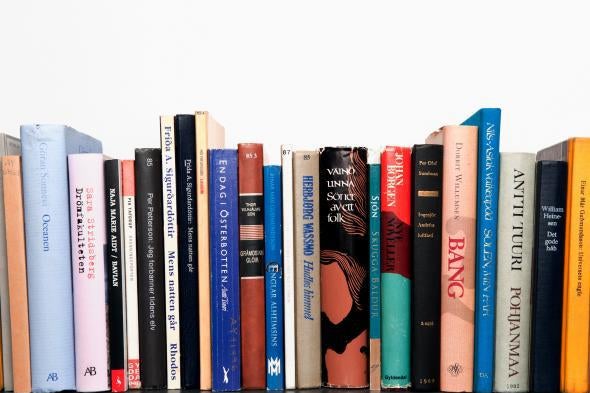I was taken aback recently to pick up an (unnamed) magazine for which I’d written an article and see my brief bio begin with the words: “Ben Yagoda is a novelist. … ” I am not a novelist, never have been, and have not (since the age of 15) even had any aspirations in that direction. When I looked into the possible reasons for the error, I came to understand that the person who wrote the bio wasn’t misinformed or making stuff up, but rather took “novelist” to mean the same as “author,” or, more specifically, “writer of books,” and maybe even more specifically than that, “writer of more or less meritorious books.”
A light bulb went off. I teach mostly writing and journalism workshops, but every once in a while, in class discussions or writing assignments, students will have reason to refer to particular nonfiction books—as I say, meritorious books, so not a guide to using your digital camera or naming your baby—and on numerous occasions they have referred to them as “novels.” I never gave this much thought till I had a conversation a few months ago with my colleague Kristen Poole, who teaches Renaissance literature. She told me that her students very frequently write things like “Shakespeare’s novel Hamlet.”
I got on Twitter and sent out a tweet asking people if they were familiar with the “novel = book” custom. Teacher Mitch Nobis responded: “In high school essays, CONSTANTLY.” Jack Lynch, a professor of English at Rutgers, said, “Close to universal among the 20-yr-olds I teach. When I do history of the novel, 80% of my effort is breaking that habit.” An extremely sharp-eyed person noted that an (unnamed) major metropolitan newspaper, in its obituary of Louis Zamperini, referred to Laura Hillenbrand’s book about him, Unbroken, as a “novel.” Lexicographer Jesse Sheidlower helpfully reported that Jonathan Lighter has long been writing about this topic on the listserv of the American Dialect Society discussion list, ADS-L. And sure enough, when I checked the archive, I found that Lighter’s bemused observations on the topic went back to 2006, when he unearthed an actual class assignment from an actual (unnamed) school:
Nonfiction Literature. Over the course of your summer break, we ask that you read a nonfiction novel concerned with a social issue in anticipation of the upcoming school year. … This reading assignment’s objective is to expose students to nonfiction material written for young adult and college-level readers. … We suggest choosing one of the following novels as an alternative: Nickel and Dimed (Barbara Ehrenreiuch); Guns, Germs, and Steel (Jared Diamond). … We suggest you read the novel twice. … Look for the primary thesis in the beginning of the book; it should be revisited in the novel’s concluding chapter.
When Truman Capote called In Cold Blood a “nonfiction novel,” he meant something very specific: that the book used the techniques of fiction but was completely factual. The above assignment used the term differently and more broadly, as did another found by Lighter: “Marine Biology Book Reviews. Read a nonfiction novel first semester and write a five-paragraph book review. Second semester, read a fiction novel or another nonfiction novel and write a five-paragraph review.”
That is, fiction novel = novel, and nonfiction novel = nonfiction book. And sure enough, a literary agent responded to my tweet: “In queries: ALL THE TIME. People telling me of their ‘nonfiction novel’ or their ‘fictional novel.’” My daughter Elizabeth Yagoda put me on to the new Amy Poehler-Paul Rudd rom-com spoof, They Came Together, where, soon after the meet-cute, the Poehler character gasps: “You like fiction books?? Fiction books is one of my favorite kinds of books!”
Even in 2006, the trend had apparently been going on for some time. Ben Zimmer posted on ADS-L a quote from the journalism professor Michael Skube, writing in the Washington Post: “College students nowadays call any book, fact or fiction, a novel. I have no idea why this is, but I first became acquainted with the peculiarity when a senior at one of the country’s better state universities wrote a paper in which she referred to The Prince as ‘Machiavelli’s novel.’ “
Garson O’Toole provided some documentation to Kristen Poole’s observation, with a couple of examples from the Yahoo Answers site, presumably posted by students:
- “In the novel Hamlet who was the character name Yorick?”
- “What is the theme of the novel ‘merchant of venice’? by shakespeare.”
I speculate that the trend has been accelerated by the arrival and success of the “graphic novel.” When that genre came on the scene, the stories were universally made up. Eventually, some creators had the bright idea of putting true stuff in comic-book form. These were called “graphic novels,” too, and have since become a thriving subgenre with an unwieldy moniker, as seen in this Amazon screenshot:
What explains the (broader) trend? In the limited commentary on the question, mention has been made of the blurring of generic boundaries, and the fuzziness of “truth” in the postmodern era—brought on by none other than In Cold Blood, with its well-documented fabrications. I tend to view it more pragmatically. English has no word to denote “nonfiction book” or “writer of nonfiction book(s).” Considering the clunkiness of the expressions in quotation marks, it’s not surprising that college students—who are frequently called on to refer to such books and writers, and who are famously not semantic sticklers—would have turned to “novel” and “novelist,” which come trippingly on the tongue.
That reminds me, play is a short and sweet and wholly unobjectionable word. If one of my students called Hamlet a novel, they would be staring at a big red F. Some things are just plain wrong.
A version of this post appeared on Lingua Franca.
